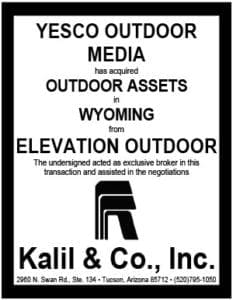 When you retain a broker to sell your out of home company you’ll be asked to sign a brokerage agreement. Here’s a short course on brokerage fees.
When you retain a broker to sell your out of home company you’ll be asked to sign a brokerage agreement. Here’s a short course on brokerage fees.
The Fee Amount
5% of the total consideration of a transaction is a starting point. Less for a large transaction and higher for a small transaction. Sometimes a Lehman formula is used: 5% of the first million, 4% of the next million, 3% of the next million 2% of the next million and 1% after that. Insider doesn’t like this formula because it gives your broker bad incentives. They make a lower commission as the price rises.
The Fee Base
The fee is based on the total consideration of a transaction. This means the commission is due on cash paid, seller notes, management agreements, loans and non-compete payments regardless of the timing of whether they are received. If you sell your company to someone else for $1 million consisting $100,000 down and a $900,000 seller note and the brokerage fee is 5%, you’ll pay a brokerage commission of $50,000 regardless of whether the note pays anything.
When The Fee is Paid
On consummation of a transaction. Avoid agreements with upfront fees regardless of success. That means the broker isn’t confident they can execute. Many brokers will want their fee wired directly to them at closing.
Out of Pockets
Many agreements will ask you to pay the broker’s travel expenses to close a transaction. This is reasonable but can probably be avoided on small, simple transactions where travel is not required or where the broker is local. Out 0f pocket expenses can be quite large when the broker has a due diligence team and the assets are spread out and in-person meetings are necessary.
What are your thoughts on brokerage commissions? Let Insider know at billboardinsider@gmail.com or use the form below.
[wpforms id=”8663″]
Paid Advertisement

















